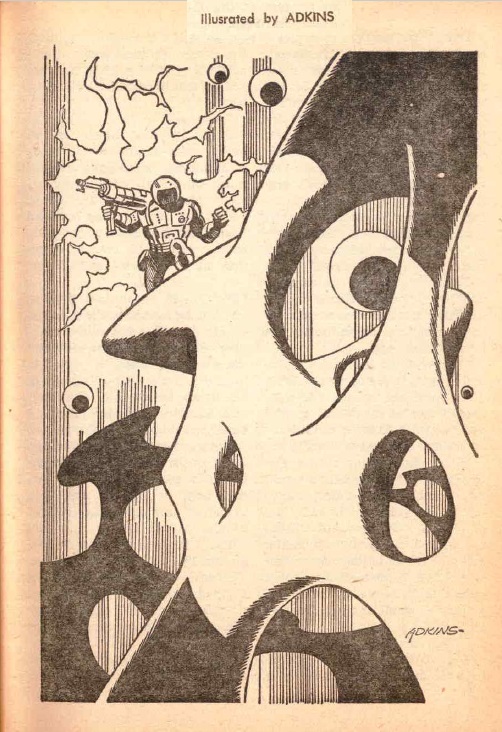
by Gideon Marcus
The Orient
Thanks to centuries of tradition, we tend to think of the Far East as…well…east! But for us, going to Japan means a 12-hour flight west—literally into tomorrow, as we cross the International Date Line to do it.

This week marked the beginning of our fourteenth trip to Japan. How things have changed since we first went back in 1948, when flying via Northwest Orient meant an entire day of travel with multiple stops. Travel these days is practically instantaneous by comparison.
We were even able to hop on a same-day domestic flight from Tokyo to Fukuoka, which is where I'm writing this. I've been able to develop my first roll of color film, the results of which I am happy to share:






The Alient
The latest issue of Galaxy is, like this month's IF, the first under the helm of Ejler Jakobsson, and it's also a month late. Will it be more interesting than the rather dull IF? Well, it's certainly different. After all, the lead piece is one I would have expected to appear in Analog. Why wouldn't Campbell want the sequel to the incredibly popular and presumably lucrative Dune. Dunno… but here it is:

by Dan Adkins
Dune Messiah (Part 1 of 5), by Frank Herbert

by Jack Gaughan
And so we return to Arrakis, the Dune planet, the only source of the spice melange, which gives the power of prophecy, allows the navigators of the Guild to ply the hyperspace lanes, and is the only currency of note in the Empire.
Last time, Paul Atreides, son of the murdered Duke of Arrakis, had seized his destiny as the kwizatz haderach, leading his army of desert Fremen against the Padisha Emperor in a coup that placed the young general in charge of a galactic domain.
It is now twelve years later, and disparate factions are plotting to overthrow Paul, who has become a figurehead in an interstellar Jihad. The plotters include the Bene Geneserit, the sisterhood that manipulated Paul and his sister, Aria's, genetic destiny; the navigators' Guild, and Irulan, wife of Paul, and daughter of the cruel Baron Harkonnen, who wrested Arrakis from Paul's father.
We know there's a plot because it is the subject of an endless scene at the beginning of the serial installment. And because Paul then discusses the plot at length with his companins at an endless meeting of state in the latter part of the serial. The plot involves predestination, an heir for Paul (his true love, the Fremen Chani, is being kept secretly sterile by Irulan, who wants to beat the child), and the reincarnated form of Duncan Idaho, one of Paul's comrades in the last book.
There. Now you don't actually have to read this chapter, which is all for the best, as it's as deadly dull and motionless as the worst parts of Dune. At least the viewpoints don't change every five sentences.
Two stars so far.
Full Commitment, by Robert S. Martin
Senator Clint is on an investigative junket to Burma, where America is in an endless war against… the Capitalists? What happened to the Communists? And why do all the soldiers parrot the exact same line when explaining why they're there to fight?
Brainwashing, obviously…which is how Clint is ultimately disposed of.
A pointless story, poorly done. One star.
The City That Was the World, by James Blish

by Dan Adkins
James Blish tells the story of a man who makes Howard Hughes look like a piker. John Hillary Dane is a man with vision…or perhaps visions is more appropriate. First, he builds an enormous pair of telescopes four miles high in the Andes. Then he erects a mile-high skyscraper in Denver, the mile-high city. While the reason for the former is never really explained (other than the obvious reasons—the seeing is much better above the majority of the atmosphere), the purpose of the immense building is the point of the story.
I don't really want to spoil things, so I'll just say that the tale deals with time travel, Malthusian overpopulation, and the value (or lack thereof) of friendship. It's a good story, although few of the elements are really plausible.
Four stars (and the best piece in the issue).
For Your Information: Eugen Sanger and the Rocket-Propelled Airplane, by Willy Ley

Willy Ley's article is on Eugen Saenger, the Austrian cum German rocket scientists perhaps best known for his design of the America Bomber—a rocket-plane that would fly high enough to skip on the upper atmosphere until it reached New York. There's a lot of good information that probably can't easily be found elsewhere, since Ley relies on at least one personal source. That said, it's kind of a dull piece.
Three stars.
A Brief History of the Revolution, by David Lunde and James Sallis
In a piece that might well have come out in Fantasy and Science Fiction (or maybe the old Galaxy sister mag, Beyond), we have a young couple hounded by their animate furniture until they are effectively evicted. The cause of all this appears to be the wife's desire to have a child.
Not very good. Two stars.
The Kinsolving's Planet Irregulars, by A. Bertram Chandler

by Reese
Last up is the latest journey of Commodore John Grimes, the famed skipper of the Galactic Rim. In a direct sequel to The Rim Gods, Grimes and his First Mate (though likely not his first mate) Sonya head back to Kinsolving’s Planet. You may recall from the last story (or the review thereof) that the team Grimes escorted tried to exploit some time-space weakness to psionically summon Jehovah. Instead, they incarnated the Olympian pantheon.
This time, their efforts throw Grimes into a fantasy land populated exclusively by fictional characters, from a certain Baker Street detective to larger-than-life but real people like Oedipus and Achilles. Things get really weird when Grimes starts to question his own reality…
I always enjoy Chandler's Rim stories, but this one is just a bit too cute. It also looks like the author is tired of the Grimes series and would love to end it…if only the money weren't good.
Three stars.
Things that came and things to come
And that's that. Quality-wise, a thoroughly unremarkable issue. Indeed, the only real bit of note is how many of the stories seem to be in the wrong magazine. I confess I am kind of looking forward to the post-Pohl era. I want to see how things change for this venerable magazine.
Of course, I also know to be careful what I wish for…
(and stay tuned for more updates from Japan!)




I rather liked "Dune Messiah" so far and didn't find it at all tedious. All right, the council scene could have been shorter, but I see all the Byzantine plotting as movement. I'm at least interested in where this is going to go. An easy three stars for me.
"Full Commitment" was pretty bad. Definitely pointless. I wonder if it was inspired by the comment George Romney made last year that ended any chance he had at the Republican nomination.
Willy Ley's article was uninspired, but it was a logical follow-up to last month's article. Maybe he'll do one about the new supersonic planes next month.
The Sallis story was awful. I might even rate it below "Full Commitment." It's the kind of thing people who screech about the New Wave point at. I'm surprised Pohl bought it. (Jakobsson may have his name on the issue, but I'm pretty sure this is the last full Pohl edition. There's no way anything Jakobsson has bought could be appearing already.)
The Grimes story had its moments. Chandler's obviously growing tired of his hero (his comments about Doyle getting sick of Holmes were pretty pointed). Since that's what sells, maybe he ought to go back and do a few more from when Grimes was still wet behind his jug-ears. There ought to be a term for this kind of story. It's not quite Bangsian fantasy, since so many of the characters are openly fictional. And of course, it then goes in an entirely different direction toward the end.
Was the Sallis even New Wave? It felt like 50s-era F&SF or Beyond to me.
I'm glad you like the Herbert. Someone must.
The furniture coming alive with no explanation was surreal enough for me to consider it New Wave. I suppose you might have seen something like it 15 years ago or so, maybe it's Sallis's connection with New Worlds that made me see it that way.
Herbert offered Dune Messiah to Analog first, John Campbell didn't like it, so didn't buy it.
I read it, I didn't like it.
Sometimes, in these later days, John Campbell could be right.
Thanks for that, Al. I suppose Campbell doesn't need to worry about circulation numbers.
ANALOG's circulation remains above 100,000, which is at least twice the mag's nearest competitors.
And, of course, it also has the benefit of being published by Conde Nast, with that publishing company's distribution system — there's no substitute for the control of the spaces on retailers' racks and shelves where magazines are sold that Conde Nas has.
Right. That's why I said Campbell doesn't care about circulation problems. He runs what he wants to run.
Hi Gideon, if you visit Hiroshima on this trip, please post a postcard of the trams there. I'm told that the city has re-established its tram system using second-hand trams from the city of Melbourne, so I'd be interested to see that.
Also, a little item of largely unknown trivia relating to Eugen Sanger. After the attempt to kidnap him by Soviet agents, he and several of his team in France applied to come to Australia in 1949 under our equivalent of Operation Matchbox (ESTEA -Employment of Scientific and Technical Enemy Aliens) to work at Woomera. However, for a variety of reasons, the applications of Sanger and his team were rejected and they remained in France.
Thank you for that! When did they do that? We haven't been back to Hiroshima since 1964.
I'm not sure exactly when the Melbourne trams were first used in Hiroshima, but I read an article several years ago about how the city of Hiroshima purchased a number of old (probably W class) trams from Melbourne to help re-establish its tramway system. I guess this would have been in the last 40s or early 50s, but my understanding is that they were still in use in the early 60s and just wondered if there are any still running today. After all, the first W class trams may have been built in the 1920s and 30s, but they are still running in Melbourne in 1969!